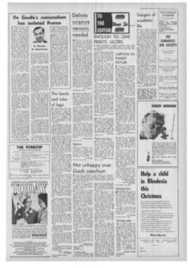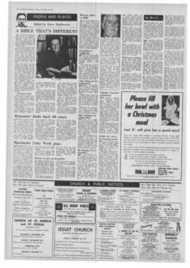Page 4, 15th December 1967
Page 4

Report an error
Noticed an error on this page?If you've noticed an error in this article please click here to report it.
Tags
Share
Related articles
Bright Catholic Prospects In Post-war Japan
Vatican Ii Divide The Church?
Teaching Truth To The Politicians
The Play
Prof. Laski Talks Too Much
DEMOCRACY AND THE CHURCH
"BUT surely, demo
cracy is a good thing, and if so, it must be a good thing in religion too. Isn't that more or less what Vatican Two was all about?"
"That's three statements you're making there, all needing lots of distinction and discrimination, What do you mean by democracy, anyway?"
"Democracy? Well, it's the opposite of autocracy, isn't it? Freedom, equality, justice for everybody, peace. and all that. Free press. Open diplomacy. Liberty, equality. fraternity. Government of the people, by the people, for the people."
"Ail those arc excellent things, high ideals. Some of them might be pre-requisites for democracy, and some no doubt fruits of it to be hoped for. But none of them is what democracy means."
"What does it mean according to you, then?"
"I'd say it's a particular method of government. It means settling things by voting, by general majority vote of the citizens. The Church isn't a democracy."
"Nor an autocracy either, I hope!"
"No, the Church is more Rice a family. A family works out a general consent somehow, with the head of the family to achieve it and carry it out."
"Well, I'd call that a democracy, too, so long as it works."
"No, because there's no voting. Everybody says what they think in a basic atmosphere of love, and in due course the consent emerges."
"Or else it doesn't. What happens then?" 'Pln a familr, the family might break up perhaps. But it shouldn't. And especially in the Church it shouldn't, because of the promises of Christ, the Holy Spirit and all that."
"A General Council settles things by majority vote, doesn't it?"
"Only as a last resort, so to speak. And it's not a vote taken of all the People of God, only the successors of the apostles, each giving his wit ness of the faith and tradition he has received."
"Wasn't there a time when the bishops themselves were elected by popular vote? Some people want to revive that, don't they?"
"If the truth were known, I expect that custom changed for very good reasons. Would anybody really want to revive it, even in Holland? With party organisations perhaps, and election-campaigns? Not an inviting thought, is it? No; voting is all right in some matters, where all the voters really know what they're voting about.
"Votes for everybody is good in some political matters, of course, especially local affairs where everybody is really concerned. Or in economic and industrial matters that are not too remote, factory management, craft affairs and so on.
"Anything where the majority is likely to be right or at least has a right to impose its will. But on many affairs of human life the majority is almost certain to be wrong, through ignorance or selfinterest or both."
"For instance?"
"Well, on practically all cultural matters. Artistic judgment, for instance. It might be all right perhaps to ask a town to vote on whether it would like to build an art gallery, but absurd to ask the citizens to vote on each picture to be bought for it.
"Or what about academic freedom, as it is called: isn't it almost the opposite of democracy? Or again, what of morality and social justice: racial discrimination, for instance: would you feel safe in putting some racial issue to a majority vote in any English pub or trade union or even a general election?
"Same with all affairs that would come under cultural headings — music, education, religion, ethics, even sport, I should think : there's not much place for democracy in the sense of popular voting.
"Catholics will never admit that a government has any right to dictate to the Church, net even a government elected by a democratic majority. And similarly inside the Church, every Catholic knows there's not much place for general voting."
"There's going to be more of it, though. What about these senates of priests, and pastoral councils of clergy and laity, that are being set up everywhere? I'm surprised to hear you talk against democratising the Church—haven't you always denounced ecclesiastical centralisation, and the iniquities of the Roman Curia and so on?"
"Sure, there was too much handing down of decisions from the top, by authorities out of touch with the rank and file. That wants changing. Everybody should feel able to make their contributions to the community. But voting is only one way of making a contribution, and not the way that matters most. What matters most is that the people who really know what they are talking about should have their say."
"But these new senates and pastoral councils will be elected, surely?"
"It's left a good deal to local choice, I think. In the English dioceses the priests' senates are to be mostly about 50 per cent elected, the rest appointed, as experts, sometimes even exofficio such as cathedral chapters.
"As for the pastoral councils and their lay-members, only experience will show how to get the best men; I would imagine judicious appointments would get better results than elections by majority vote, wouldn't you?
"In the Westminster diocese I believe they are trying to get at the opinions of the grassroots parishioner, by circulating some sort of questionnaire to everybody at Mass.
"In Holland, too, they're making great efforts with a sort of nation-wide Pastoral Council: all sorts of open letter-boxes for suggestions and hundreds of convergent discusion groups, but not much voting as far as I can make out.
"Who are the lay-folk anyway — are they just a few highly articulate academics, or a few devoted church workers, or a few highly vote-catching orators, or are they everybody at Mass, and perhaps even some not at Mass?" "You've got a real problem there—whes going to speak for the laity. The best ones are not always the successful-candidate-type, are they? Experience will show. It'll be a real opportunity for the Holy Ghost!"
"Indeed it will! You know. I like a bit of advice I found in an American paper, from a Catholic layman named Michael Novak. I've gat it here, listen, he was talking to some Catholics who were forming a national association of laymen: 'Do not be just one more power-group: be a yoke, helping to make the Church into a community. The one power of the layman, the only power he asks for and the only one he needs, is to speak the truth. To speak the truth brings about far more changes than passing new laws.' " "Yes, that's a whole programme in itself, isn't it? Be a voice, not just a vote! 1 suppose there are some things where lay-folk wouldn't want much vote, in things such as the liturgy."
"Oh, I don't know. They might want to vote about the vernacular, especially if there were two or three vernaculars spoken in the parish. When evening Mass first came in, I remember I took a referendum about the best time to have it. There were different views, though, and in the end I had to decide myself."
"Anyhow, they'd had their say. Now, tell me, what do you think about these latest Curial reforms? Don't they go some way to democratise the Church?"
"They seem to me pretty good, but don't call them democracy. What they do is to put the Curia firmly in its place as regards the Pope, giving him real control, and probably that's the immediate need. Remember poor old Pope John, telling people in his bewilderment: They refuse the Pope I They refuse the Pope! There'll be less of that, apparently.
"One chief point remains unsettled, doesn't it—who is to elect the Pope in future?"
"True. But happily there seems to be no hurry about that at present."
blog comments powered by Disqus











